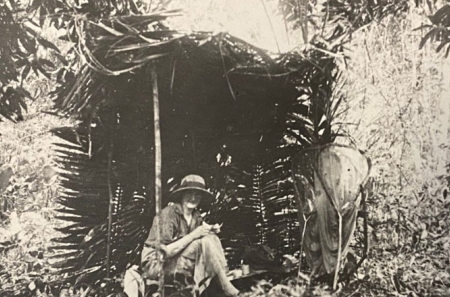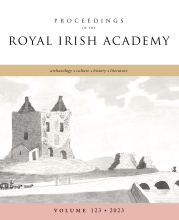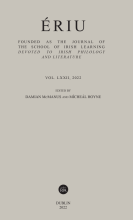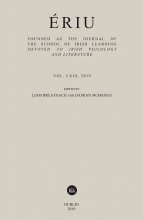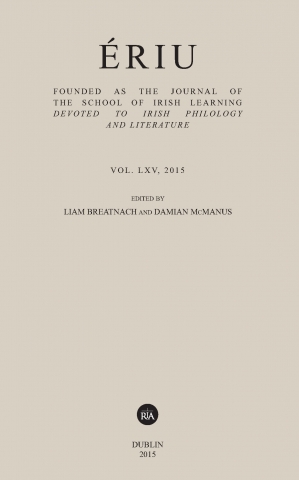
Ériu Volume LXVI (66), 2016 (Print Copy)

Edited by: Liam Breatnach and Damian McManus
Ériu is devoted to Irish philology and literature, and from its foundation in 1904 the peer-reviewed journal has had a reputation internationally among Celtic scholars. In the century since its inception, Ériu has served as an outlet for the work of the early standard bearers of Irish language studies and Celtic studies and of each new generation of researchers in turn.
Earlier issues, along with the most recent issue, are available in print form exclusively here on our website or by subscription to JSTOR, and can be viewed there. Online copies are also available by subscription to JSTOR.
Included in the purchase of this print copy is the option for a free online copy of this issue on JSTOR.
All links below will take you directly to the article on JSTOR.
CONTENTS
- On old Irish collective and abstract nouns, the meaning of cétmuinter, and marriage in early mediaeval Ireland (pp. 1-29)
Liam Breatnach
-
The final transformation of Étaín (pp. 31-38)
John Carey
-
On the old Irish third palatalisation and the 3sg. present of the copula (pp. 39-62)
Aaron Griffith
-
An adjectival construction indicating lesser degree in early modern Irish (pp. 63-75)
Mícheál Hoyne
-
Gofraidh Óg Mac an Bhaird cecinit: 2. Do dúisgeadh gaisgeadh Gaoidheal (pp. 77-109)
Eoin Mac Cárthaigh
-
Miscellanea on classical Irish: 1 cadad at -s s- boundaries. 2 the conjunctionless comparative. 3 the appositional genitive (pp. 111-134)
Damian McManus
-
Desire and divorce in Serglige Con Culainn (pp. 135-166)
Gregory Toner
-
Prímchenéla and fochenéla in the Irish Sex Aetates Mundi (pp. 167-178)
Patrick Wadden
-
Adomnán, Arculf and the mosque on the Temple Mount (pp. 179-190)
David Woods
-
Varia I. Hiberno-latin quantotus, tantotus (pp. 191-194)
Anthony Harvey
-
Varia II. IGT/BST citations and duplicate entries: further identifications (pp. 195-197)
Eoin Mac Cárthaigh
-
Varia III. Gulide, Guile and Gulinus: an Irish type for a twelfth-century Latin story (pp. 199-201)
Richard Sharpe
-
Abbreviations (pp. 203-205)

